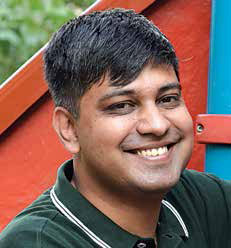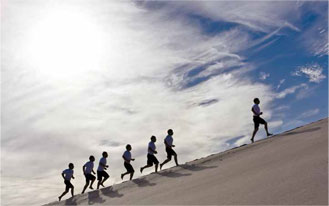
“If you can change your habits, you can be master of your destiny” – Upanishads
In the corporate leadership ladder everyone wants to improve, but only a few persist in their efforts. In this experience which I share from the literature I have read on Sustaining Leadership, we will find out how we can overcome this inertia.
It is universal experience that resistance to change the habits of thought, word and deed— which develop over a long period of time and are reflected in our character—is extremely strong. It is like the tremendous gravity-pull experienced by space vehicles before they break out from the earth’s gravity to go into space. More energy is spent in the first few minutes of lift-off, and the first few miles of travel, than is required during the rest of the journey, for days on end, and millions of miles, to reach the moon or other planets. The same is the case when we want to break away from our deeply embedded negative habits like selfishness, procrastination, lack of perseverance, dishonesty, etc., which are serious impediments to effective leadership. To succeed in breaking away involves more than a little will power and a few minor changes in our lives. ‘Lift-off’ takes tremendous effort, but once we break out of the gravity pull, our freedom takes on whole new dimensions. It is because of these great difficulties that thinkers and savants like Patanjali have advised that transformation needs determined effort over a long time, so that we can alter the very course of our lives and become masters of our destiny.
In order to change our habits it is important that:
In a nutshell, success in changing habits depends on the interaction and balance of the above three factors which complement each other in the journey of sustained leadership development.
‘It is like the tremendous gravity-pull experienced by space vehicles before they break out from the earth’s gravity to go into space. More energy is spent in the first few minutes of lift-off, and the first few miles of travel, than is required during the rest of the journey’
Once we are clear in our mind on ‘what, why and how’ we want to transform, we have to evolve an action programme which will lead us to our goal. If we want to be masters of our destiny by transforming our character, we must invest substantially in the main instrument that will give us this mastery—ourselves. The main investment that is needed has also been tested over and over again in human history, in all societies and cultures, around the world. The essential inputs for this transformation are : a) time and patience, and b) will-power to persist.
The experience of transformation of human nature suggests that balanced investment of time and will-power in a few activities keeps a person motivated in persisting to transform himself. Incessant industrious work is the secret of success; remembering all the time that “all true work is rest” and indeed, “change of work is leisure.

Investment in the health of the body: Only a healthy body that can endure hard physical and mental work, and can contribute to rapid transformation or success in any venture. About 45 minutes a day of devoted to exercise is most essential. Yogic exercises, evolved in India, are an excellent system to improve the health of the body and the mind. However, walking, jogging, exercises in a gymnasium, swimming and so on are also good. Eating food that is pure, simple and prepared with love, is also essential. Most of our illnesses are caused by eating the wrong types of food, over-indulgence and lack of exercise. It is now very well established that reducing our intake of food to about 70 percent of what is considered normal contributes to good health, clarity of mind and longevity.
Investment in the health of the mind: The mind of man is an extraordinary repository of power, as summed up by the Indian experience, and told in historic literature and shared stories. Thoughts, emotions, memory, imagination and discrimination are all functions of the mind. Just as the face and voice of one man differs from another, so also his mental world, his mode of thinking, his way of understanding things and his reaction to events differ. Consequently, in the Indian experience of the transformation of man, great emphasis is laid on the purity of health and control of the mind. Meditation and reading are the time-tested techniques of keeping the mind alert, responsive, vigorous, stimulated and positive. Reading books on great lives, classics, literature from one’s field of work, on subjects of leadership and spirituality should become part of our daily routine. The aim of everyone who aspires to soar high should be to read an average of 18 books a year, the average figure for most successful men.
Investment in spiritual health: Emphasis on spiritual growth in the process of transformation of man is a major part of man’s heritage. Its importance in leadership effectiveness is now finding recognition in the West as well. Stephen Covey while recommending meditation observes, “The spiritual dimension is your center, your commitment to your value system. It is a very private area of life and a supremely important one. It draws upon the sources that inspire and uplift you to the timeless truths of all humanity.” It is through meditation for 20-30 minutes a day that we can contemplate over the timeliness, and ponder over questions of “Who am I?”, “What is the purpose of my life?” and “What is the secret of enduring bliss?”, thus awakening the hidden divinity present in each one of us, rising above religious sentiment. “It is good to be born in a religion but not good to die in one. Grow and rescue yourself from the limits of regulations, doctrines that fence in your freedom of thought, the ceremonies and rites that restrict and direct. Reach the point where churches do not matter, where roads end from where all began.” This investment in the spirituality of the self is most productive in inspiring us to supreme efforts of sustained leadership and selflessness.
‘The mind of man is an extraordinary repository of power, as summed up by the Indian experience, and told in historic literature and shared stories. Thoughts, emotions, memory, imagination and discrimination are all functions of the mind’
Investment in the health of the society: Seva (service) to fellow human beings, not for reward or recognition, but for its own sake is the most exhilarating experience in our lives. “The hands that serve are holier than the lips that pray” is an apt saying. Yet we are reluctant to undertake such activity. The pleasure that we derive from anonymous service is far beyond any other source of joy, and yet most of us shy away from it. For the transformation of our character, service without any selfish motive gives us potent inspiration to persist. It is so because ‘service broadens your vision, broadens your awareness, deepens your compassion.’ This is also the reason why service is a key activity for effective leadership. “If one who understands the spirit of service becomes a leader, that leader will always retain and enjoy his leadership through service. Without understanding service and first becoming a leader servant, one cannot become a leader.” The Indian ethos in this field is summed up in the Sanskrit word ‘Paropakara’, which means and enjoins citizens to ‘live for others’. Dr Hans Selye, in his monumental work on stress concludes that “a long, healthy and happy life is the result of making contributions, of having meaningful projects that are personally exciting and contribute to and bless the lives of others.” The same is the conclusion of George Bernard Shaw when he says – “This is the true joy in life—that being used for a purpose recognised by yourself as a mighty one. That being a force of nature instead of a feverish, selfish little clod of ailments and grievances, complaining that the world will not devote itself to making you happy. I am of the opinion that my life belongs to the whole community, as long as I live, it is my privilege to do for it, whatever I can.” Our aim, every day, should be to “at least serve one other by making deposits of unconditional support, love and care.” We can then be harbingers of joy, hope and sunshine. Each day will then be a day of our own growth and transformation as well.
If we invest in our transformation as discussed above, then we shall acquire life-long inspiration to grow and become masters of our destiny.
Lastly, we should inculcate enormous potential and insight by reading about outstanding lives with a view to soaring to greater heights. We must not place a ceiling on our vision and ideals. I would like to end with the well articulated concept advocated by Bhishma in a beautiful Sanskrit verse, meaning, “Only a man of steady character and wisdom can carry out the task of leading and administering a kingdom effectively”
By C S Raghavan